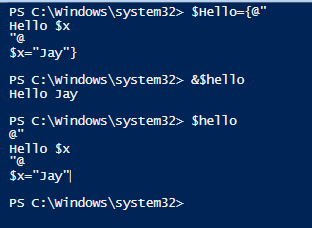Yes.
Review this link before you begin.
You can have a variable in Here-strings but you need to define the variable in the same session. Here is how you do it:
Declare $hello as follows:
$Hello={@"
Hello $x
"@
$x="Jay"}
In order that the variable is expanded run the following:
&$Hello
(This is not case sensitive, you can as well run, &$hello)
and you will get the response:
Hello Jay
(hello or Hello: not case sensitive)
Variable declaration can be in the beginning also as shown:
PS C:\Windows\system32> $Hello={$x="Jay"
@"
Hello $x
"@
}
PS C:\Windows\system32> &$hello
Hello Jay
PS C:\Windows\system32>
Note that defining the variable in single quotes will not alter the response.
Review this link before you begin.
You can have a variable in Here-strings but you need to define the variable in the same session. Here is how you do it:
Declare $hello as follows:
$Hello={@"
Hello $x
"@
$x="Jay"}
In order that the variable is expanded run the following:
&$Hello
(This is not case sensitive, you can as well run, &$hello)
and you will get the response:
Hello Jay
(hello or Hello: not case sensitive)
Variable declaration can be in the beginning also as shown:
PS C:\Windows\system32> $Hello={$x="Jay"
@"
Hello $x
"@
}
PS C:\Windows\system32> &$hello
Hello Jay
PS C:\Windows\system32>
Note that defining the variable in single quotes will not alter the response.

No comments:
Post a Comment